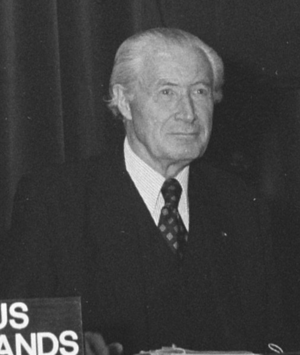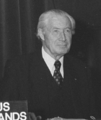Duncan Sandys facts for kids
Quick facts for kids
The Lord Duncan-Sandys
|
|||||||||||||
|---|---|---|---|---|---|---|---|---|---|---|---|---|---|

Sandys in 1975
|
|||||||||||||
| Secretary of State for the Colonies | |||||||||||||
| In office 13 July 1962 – 16 October 1964 |
|||||||||||||
| Prime Minister | Harold Macmillan Sir Alec Douglas-Home |
||||||||||||
| Preceded by | Reginald Maudling | ||||||||||||
| Succeeded by | Anthony Greenwood | ||||||||||||
| Secretary of State for Commonwealth Relations | |||||||||||||
| In office 27 July 1960 – 16 October 1964 |
|||||||||||||
| Prime Minister | Harold Macmillan | ||||||||||||
| Preceded by | The Earl of Home | ||||||||||||
| Succeeded by | Arthur Bottomley | ||||||||||||
| Minister of Aviation | |||||||||||||
| In office 14 October 1959 – 27 July 1960 |
|||||||||||||
| Prime Minister | Harold Macmillan | ||||||||||||
| Preceded by | Office Created | ||||||||||||
| Succeeded by | Peter Thorneycroft | ||||||||||||
| Minister of Defence | |||||||||||||
| In office 14 January 1957 – 14 October 1959 |
|||||||||||||
| Prime Minister | Harold Macmillan | ||||||||||||
| Preceded by | Anthony Head | ||||||||||||
| Succeeded by | Harold Watkinson | ||||||||||||
| Minister of Housing and Local Government | |||||||||||||
| In office 19 October 1954 – 4 January 1957 |
|||||||||||||
| Prime Minister | Winston Churchill Sir Anthony Eden |
||||||||||||
| Preceded by | Harold Macmillan | ||||||||||||
| Succeeded by | Henry Brooke | ||||||||||||
| Minister of Supply | |||||||||||||
| In office 31 October 1951 – 19 October 1954 |
|||||||||||||
| Prime Minister | Winston Churchill | ||||||||||||
| Preceded by | George Strauss | ||||||||||||
| Succeeded by | Selwyn Lloyd | ||||||||||||
|
|||||||||||||
| Member of Parliament for Streatham |
|||||||||||||
| In office 23 February 1950 – 8 February 1974 |
|||||||||||||
| Preceded by | Sir David Robertson | ||||||||||||
| Succeeded by | William Shelton | ||||||||||||
| Member of Parliament for Norwood |
|||||||||||||
| In office 14 March 1935 – 15 June 1945 |
|||||||||||||
| Preceded by | Sir Walter Greaves-Lord | ||||||||||||
| Succeeded by | Ronald Chamberlain | ||||||||||||
| Personal details | |||||||||||||
| Born | 24 January 1908 Sandford Orcas, Dorset, England |
||||||||||||
| Died | 26 November 1987 (aged 79) London, England |
||||||||||||
| Political party | Conservative | ||||||||||||
| Spouses |
Diana Churchill
(m. 1935; div. 1960)Marie-Claire Schmitt
(m. 1962; died 1969) |
||||||||||||
| Relations |
|
||||||||||||
| Children | 4, including Edwina Sandys and Laura Sandys | ||||||||||||
| Parents |
|
||||||||||||
| Alma mater | |||||||||||||
| Profession | Diplomat | ||||||||||||
| Military service | |||||||||||||
| Allegiance | |||||||||||||
| Branch/service | |||||||||||||
| Years of service | 1937–1946 | ||||||||||||
| Rank | Lieutenant-Colonel | ||||||||||||
| Unit | Royal Artillery | ||||||||||||
| Battles/wars | Norwegian Campaign | ||||||||||||
Edwin Duncan Sandys, Baron Duncan-Sandys (born January 24, 1908 – died November 26, 1987) was an important British politician. He served as a minister in several Conservative governments during the 1950s and 1960s. He was also the son-in-law of the famous wartime Prime Minister, Winston Churchill. Duncan Sandys played a big part in helping European countries work together after World War II.
Contents
Early Life and Education
Duncan Sandys was born on January 24, 1908, in Sandford Orcas, a village in Dorset, England. His father, George John Sandys, was also a politician who served as a Member of Parliament. Duncan Sandys attended two well-known schools: Eton College and Magdalen College, Oxford.
Starting His Career
After finishing his education, Sandys began working in the diplomatic service in 1930. This meant he worked for the British government, dealing with other countries. He worked in London and at the British embassy in Berlin.
Becoming a Member of Parliament
In March 1935, Duncan Sandys became a Conservative Party Member of Parliament (MP) for Norwood in south London. He won this seat in a special election called a by-election.
The Duncan Sandys Case
In 1937, Sandys joined the Territorial Army, a part-time military force. He asked questions in the House of Commons about national security, using what he learned from his military experience. Because of this, he was threatened with legal action under a law called the Official Secrets Act 1920. However, a special committee in Parliament decided that what MPs say in the House of Commons is protected and not subject to this law. This event led to a new law, the Official Secrets Act 1939, being created.
During World War II
During World War II, Duncan Sandys fought with his army unit in the Norwegian campaign. He was injured during this time, which caused him to have a permanent limp.
His father-in-law, Winston Churchill, gave him his first job as a minister in the government. From 1941 to 1944, he was the Financial Secretary to the War Office. This meant he helped manage the money for the army. He also worked at the Ministry of Supply, which was in charge of providing equipment for the war.
Later, from 1944 to 1945, he became the Minister of Works. In this role, he led a special committee that worked on defending Britain against German flying bombs and rockets. After the war, he lost his seat in Parliament in the 1945 election.
Helping to Unite Europe
Duncan Sandys played a very important role in creating the European Movement. This movement aimed to bring European countries closer together after the war. In 1947, he started the United Europe Movement in Britain. This followed a speech by Winston Churchill, who had called for European countries to work together for peace and freedom.
Sandys worked with other groups that wanted European unity. They held a big meeting called the Congress of Europe in The Hague in May 1948. About 750 people from all over Europe attended. After this meeting, the different groups officially formed the European Movement. Sandys was a key leader in this new organization.
He also served as a member of the Consultative Assembly of the Council of Europe from 1950 to 1951.
After the War: Back in Parliament
In 1950, Duncan Sandys was elected back into Parliament as the MP for Streatham. When the Conservative Party won the election in 1951, he was given several important jobs in the government:
- Minister of Supply (1951-1954): He was in charge of providing supplies for the country.
- Minister of Housing (1954-1957): In this role, he introduced important laws like the Clean Air Act, which helped reduce pollution. He also introduced the idea of green belts, which are areas of undeveloped land around cities to prevent them from growing too large.
- Minister of Defence (1957-1959): As Defence Minister, he suggested a big change for the Royal Air Force. He wanted to stop using fighter planes and instead focus on missile technology. This decision later caused problems for some British aircraft companies.
- Minister of Aviation (1959-1960): He oversaw the aviation industry.
- Secretary of State for Commonwealth Relations (1960-1962) and then Secretary of State for the Colonies and Commonwealth Relations (1962-1964): In these roles, he was responsible for helping many British colonies become independent countries.
After the Conservative government lost power in 1964, Sandys remained in the shadow cabinet, which is a group of opposition politicians who would take on ministerial roles if their party won the next election. He supported Rhodesia's independence. He left the shadow cabinet in 1966.
He retired from Parliament in 1974. He was then given a special honor called a life peerage, which meant he became a member of the House of Lords for the rest of his life. He chose the title Baron Duncan-Sandys.
Personal Life
In 1935, Duncan Sandys married Diana Churchill, who was the daughter of Winston Churchill. They later divorced in 1960. In 1962, he married Marie-Claire Schmitt.
Duncan Sandys passed away on November 26, 1987, in London. He is buried in the churchyard of St Nicholas in Child Okeford, Dorset.
Children
Duncan Sandys had four children. From his first marriage to Diana Churchill:
- Julian Sandys (1936–1997)
- Edwina Sandys (born 1938)
- Celia Sandys (born 1943)
From his second marriage to Marie-Claire Schmitt:
- Laura Sandys (born 1964), who also became a Conservative Member of Parliament.
Other Interests
Duncan Sandys was very interested in historic architecture and preserving old buildings. He started the Civic Trust in 1957, which works to protect and improve towns and cities. He was also the president of Europa Nostra, an organization that works to preserve Europe's cultural and architectural heritage.
Career Summary
Here is a summary of Duncan Sandys' main government roles:
- Coalition Government (during World War II)
- Financial Secretary to the War Office: 1941–1943
- Parliamentary Secretary, Ministry of Supply: 1943–1944
- Minister of Works: 1944–1945
- Caretaker Government (after World War II)
- Minister of Works: 1945
- Conservative Government (1950s-1960s)
- Minister of Supply: 1951–1954
- Minister of Housing and Local Government: 1954–1957
- Minister of Defence: 1957–1959
- Minister of Aviation: 1959–1960
- Secretary of State for Commonwealth Relations: 1960–1962
- Secretary of State for the Colonies and Commonwealth Relations: 1962–1964
Images for kids
 | Aaron Henry |
 | T. R. M. Howard |
 | Jesse Jackson |


